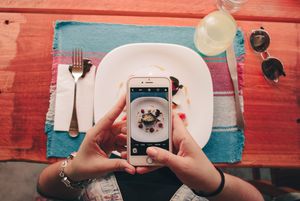
No matter what you did today on your computer or phone, it is very likely that social media was involved. Perhaps, you caught up with your friends on Facebook, updated your status in Twitter or shared a photo of your pets on Instagram?
Statistically, you are more likely to use social media than not. According to the data collected by Statista from 2008 to 2018, approximately 77% of all Americans have a social media profile of some kind.
However, despite the increasing number of social media platforms, there is a remarkable lack of clear data about how they affect us personally: our behaviors, our social relationships, and our mental health. In many cases, the information that is available doesn’t look very promising.
Studies have linked the use of social media to depression, insomnia, anxiety, lower self-esteem, inattention, and hyperactivity – most often in teens and adolescents. The list of side effects goes on. However, these studies are almost entirely of an observational or correlational nature, meaning they don’t prove whether or not one is causing the other.
A common argument against the theory that social media causes individuals to feel more depressed and lonely is simply that those who are more depressed and lonely are more inclined to use social media as a way of reaching out.
Does Social Media Cause Depression?
A recent study published in the Journal of Social and Clinical Psychology concluded that there is, in fact, a causal link between the frequent use of social media and negative effects on well-being, primarily depression and loneliness. The researchers said this is the first time a causal link has been established in scientific research.

The study included University of Pennsylvania 143 students. The participants were randomly assigned to one of two groups: one that would significantly limit use of social media and the one that would continue their social media habits as usual.
During the three weeks, the experimental group had their social media use reduced to 30 minutes per day. To keep these experimental conditions, researchers tracked the phone usage data, documenting how much time was spend on each app every day. All the study participants had to use iPhones.
The results were clear: the group of participants that used less social media, even though it wasn’t completely eliminated, had better mental health outcomes. Baseline readings for participants were taken at the beginning of the trial in several areas of well-being: social support, loneliness, anxiety, fear of missing out, self-esteem, autonomy, and self-acceptance.
 At the end of the trial, those in the experimental group experimented both loneliness and depressive symptoms decline, with the large changes happening in those who reported greater levels of depression.
At the end of the trial, those in the experimental group experimented both loneliness and depressive symptoms decline, with the large changes happening in those who reported greater levels of depression.
Meanwhile, both groups saw a decline in levels of anxiety and fear of missing out, which the researchers posit as a potentially coming from users simply becoming more aware of their social media use by participating in the experiment
Our busy lives
How could systems designed to make our communication easier and bring us closer to our friends and family be bad for our mental health?
Very much like the algorithm that powers your Facebook, it is complicated. A professor of psychology at the University of Michigan, Oscar Ybarra, Ph.D., has published a piece on the relationship between Facebook and certain mental health outcomes.

He notes that even if individuals are aware of the “curated” nature of many online platforms, “they nevertheless feel like their life is stacking up compared to what these people are presenting. These constant “upward social comparisons” can happen hundreds of time each day, depending on how frequently you check your social media feeds.
Depression in Millennials: Stats
A study published in the Journal of Applied Biobehavioral Research showed that millennials struggling with depression aren’t being helped by their use of Facebook, Instagram or Snapchat. Researchers found that college students who have been diagnosed with the major depression tend to use social media more often.
Young adults are more likely to use social media in ways that exacerbate of highlight their depression or insecurities. For example, depressed young adults are more likely to compare themselves to other people on social media who appear better off than them.

Depressed young adults are also more likely to be bothered if tagged in an unflattering picture, less likely to post pictures of themselves with other people, and more likely to self-censor what they posted to avoid the judgment of others. The depression can have a variety of dangerous outcomes. Behaviors that indicate depression and/or suicidal ideation are included.
According to the Echo Recover – a nonprofit addiction recovery foundation – here are some facts regarding anxiety and depression in adolescents and young adults.
- Suicide is the second-leading cause of death in people aged 10-24 years old
- American students in grades 7 through 12 make an average of 5,240 suicide attempts per day
- More people die of suicide than homicide in the U.S.
- Only 30 percent of depressed teens are getting treatment
- Suicide-related behavior among American teens has steadily increased from 2009 to 2017
Another study conducted by Jean Twenge, Ph.D., professor of psychology at San Diego State University, shows that 5 times as many high school and college students deal with anxiety now than the same age group during the Great Depression.
The FOMO is Real
Fear of missing out, or FOMO, is another mental health effect that has been strongly linked with the use of social media.
 Although a relatively new phrase often attributed to millennial ennui, psychologists say it has real social significance. Amy Summerville, Ph.D., a professor of psychology at Miami University in Ohio, is an expert on issues of regret and the psychology of “what might have been.”
Although a relatively new phrase often attributed to millennial ennui, psychologists say it has real social significance. Amy Summerville, Ph.D., a professor of psychology at Miami University in Ohio, is an expert on issues of regret and the psychology of “what might have been.”
She explains that FOMO is an extension of larger issues of inclusion and social standing. Once our basic needs are met, like food, shelter, and water, the need for inclusion and social interaction ranks right up there.
Toady’s ubiquitous use of social media and technology has created a world in which we can gaze into our own crystal ball and see what our friends are doing at almost any time of the day. And that is not necessarily a good thing. Social media use can harm your mental health, especially when it is used more frequently. Setting limits and sticking to them can help minimize these effects.

One Comment
Bundles posted on July 24, 2024 at 2:34 pm
Young adults are more likely to use social media in ways that exacerbate of highlight their depression or insecurities. For example, depressed young adults are more likely to compare themselves to other people on social media who appear better off than them.